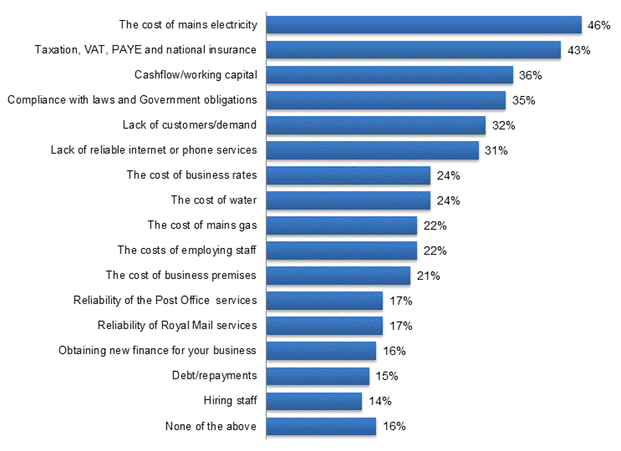Unreliable broadband is costing small firms
More than half of small businesses who use internet would lose money, business or not be able to trade at all if they did not have a reliable internet connection, finds Citizens Advice.
The national charity and consumer advocate launches a new report today highlighting the challenges faced by small businesses when engaging with regulated markets.
The report finds that a high proportion of small businesses have experienced problems with phones and broadband (30%) compared with other services such as energy, post and water.
Included in the report is a study of 2,000 small firms which reveals that:
•3 in 10 are concerned about unreliable broadband services.
•A third have experienced problems with their internet or phone services in the last 12 months.
•46% are concerned about the cost of electricity.
•Almost a third are anxious about a lack of customers or demand.
•Just over 1 in 6 (16%) say access to new finance is a worry.
Almost 1 in 4 of all small businesses have complained to their internet provider about problems. The most common complaints are to do with intermittent service or no connection at all; mentioned by 92% of those who have complained.
Electricity is an unavoidable cost for the majority of businesses and the amount they use can vary greatly. Firms with relatively low consumption can mean they lack the market power to negotiate good deals or there are simply not the deals and contracts on offer that would best suit their needs. Two thirds (65%) of small businesses surveyed by the Federation of Small Businesses in 2014 agreed that they found switching energy provider difficult.
Gillian Guy, Chief Executive of Citizens Advice, said:
“Poor broadband services are costing small firms business. Many are using the internet to communicate with customers, place orders for stock and shop around for the best priced supplies. A reliable broadband service is essential for firms to be able to operate.
“While access to finance continues to be a worry for some firms, it is the cost of running equipment and lighting offices that is a more common concern as firms fear prices are only going to go up.
“Britain is enjoying a surge in entrepreneurialism but all too often the needs of small businesses fall through a gap. They don’t have the consumer protections that households have and haven’t the negotiating power of big business. This is why regulators and business groups need to make sure small firms are able to thrive and aren’t at a disadvantage. Citizens Advice will be working to make sure small businesses have the protections and help they need to get the best from the markets and services that are essential for their businesses.”
Margaret Lynch, Chief Executive of Citizens Advice Scotland said:
“Due to our geography and the make-up of our economy, many businesses in Scotland are vulnerable to broadband problems. There are 150,000 small enterprises in Scotland, employing over 600,000 people - a higher proportion of the workforce than in the rest of the UK. Around 50,000 small enterprises are based in rural Scotland, who are even more likely to experience problems with broadband connection. Any problems that these enterprises face can threaten their viability and can mean a poorer service for local consumers. In rural areas, this can have a bigger impact than in larger towns where workers can find other employment and consumers can use other businesses.”
Where small businesses have access to the internet, the majority use it for email (83%), to order stock and services (71%), to manage and pay bills (71%) and to compare prices for suppliers (67%).
The chart below shows what small businesses consider to be significant concerns:

-ends-
Notes to editors:
The Citizens Advice service comprises a network of local bureaux, all of which are independent charities, the Citizens Advice consumer service and national charity Citizens Advice. Together we help people resolve their money, legal and other problems by providing information and advice and by influencing policymakers. For more see the Citizens Advice website .
The advice provided by the Citizens Advice service is free, independent, confidential, and impartial, and available to everyone regardless of race, gender, disability, sexual orientation, religion, age or nationality.
To find your local bureau in England and Wales, visit citizensadvice.org.uk . You can also get advice online at adviceguide.org.uk
You can get consumer advice from the Citizens Advice consumer service on 03454 04 05 06 or 03454 04 05 05 for Welsh language speakers
Citizens Advice Bureaux in England and Wales advised 2.3 million clients on 5.4 million problems from October 2013 to September 2014. For full 2013/2014 service statistics see our quarterly publication Advice trends
Citizens Advice service staff are supported by more than 21,000 trained volunteers, working at over 3,000 service outlets across England and Wales.